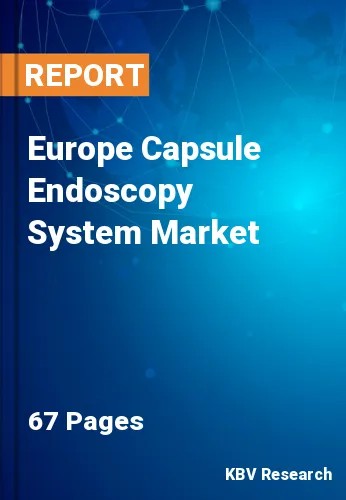The Europe Capsule Endoscopy System Market would witness market growth of 11.9% CAGR during the forecast period (2022-2028).
Capsule endoscopy is a treatment that involves taking photographs of the digestive tract with a small wireless camera. A capsule endoscopy camera is contained within a vitamin-sized capsule that is swallowed. The camera in the capsule collects thousands of photographs as it goes through the digestive tract and transmits them to a recorder user wears on a belt around the waist. Capsule endoscopy allows doctors to look inside the small intestine, which is difficult to reach with standard endoscopy. Endoscopy is a procedure in which a long, flexible tube with a video camera is sent down the throat or through the rectum.
Capsule endoscopy systems consist of a workstation, data recorder, sensor, and software that work together with wireless capsules. The data recorder is a device that must be worn around the patient's waist for the data acquired by the video capsule to be communicated via sensors. The location and movement of the capsule inside the stomach can also be tracked using data recorders. Small intestinal disease, esophageal disease, and, most recently, colonic disease have all benefited from technological developments in capsule endoscopy systems.
In Europe, healthcare is delivered through a variety of distinct systems operated at the national level. Most European countries have a closely regulated, competitive private health insurance market, with government subsidies available to citizens who cannot afford coverage. The high healthcare expenditure levels in Germany, France, Italy, and the United Kingdom, combined with a large presence of prominent market players supplying technically advanced capsule endoscopy devices and systems, make it a fertile ground for the capsule endoscopy systems market to grow in the near future.
In patients with unclear gastrointestinal bleeding, the European Society of Gastrointestinal Endoscopy (ESGE) advises small-bowel video capsule endoscopy as the first-line examination (strong recommendation, moderate quality evidence). To enhance the diagnostic yield in patients with overt obscure gastrointestinal bleeding, ESGE suggests doing small bowel capsule endoscopy as soon as feasible after the bleeding episode, ideally within 14 days. These guidelines are likely to positively influence the demand for capsule endoscopy.
The Germany market dominated the Europe Capsule Endoscopy System Market by Country in 2021, and would continue to be a dominant market till 2028; thereby, achieving a market value of $93.9 million by 2028. The UK market is estimated to grow at a CAGR of 10.9% during (2022 - 2028). Additionally, The France market would display a CAGR of 12.7% during (2022 - 2028).
Based on Component, the market is segmented into Capsule Endoscope and Work-stations & Recorders. Based on Disease Type, the market is segmented into Small Intestine Disorder, Esophageal Disorder, and Colonic Disorder. Based on countries, the market is segmented into Germany, UK, France, Russia, Spain, Italy, and Rest of Europe.
Free Valuable Insights: The Global Capsule Endoscopy System Market will Hit $1.4 Billion by 2028, at a CAGR of 12.1%
The market research report covers the analysis of key stake holders of the market. Key companies profiled in the report include Fujifilm Holdings Corporation, Medtronic PLC, Olympus Corporation, Check Cap Ltd., CapsoVision, Inc., Chongqing Jinshan Science and Technology Group Co., Ltd., IntroMedic Co., Ltd., RF Systems Lab, Shangxian Minimal Invasive, Inc., and AnX Robotica Corp.
By Component
By Disease Type
By Country
Our team of dedicated experts can provide you with attractive expansion opportunities for your business.

